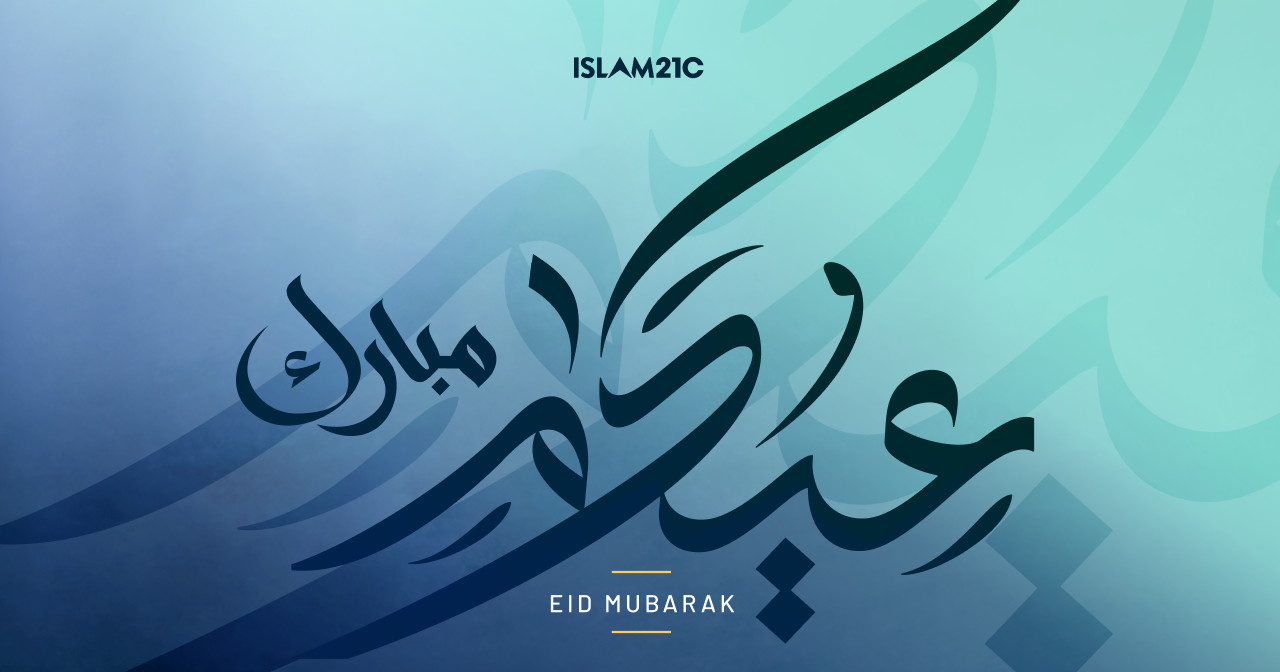In the Name of Allah, the most Gracious and most Merciful. All praise belongs to Allah. May the peace and blessings of Allah be upon His Final Messenger, Muhammad ﷺ, his family, and his companions.
First Khutbah
We are gathered here on this great and blessed day, to glorify Allah and thank Him for the greatest blessing of worshipping Him alone and following the Prophet Muhammad ﷺ.
This day is called Eid al-Adha, the second Eid in Islam. The Prophet ﷺ said that we have only two Eids: Eid al-Fitr and Eid al-Adha.
All of our Eids come after great acts of worship (ibādah). Eid al-Fitr comes after the great ibādah of fasting in Ramadan. Eid al-Adha comes right after the great Day of Arafah.
Spending time in devotion on the Plains of Arafah on the 9th of Dhul Hijjah is the central pillar of Hajj, followed by spending the night in Muzdalifah, and then the stoning of the jamarāt, slaughtering of the sacrificial animal (hady), and cutting of the hair.
Allah (subḥānahu wa ta’āla) says in the Qur’ān,
لَيْسَ عَلَيْكُمْ جُنَاحٌ أَن تَبْتَغُوا فَضْلًا مِّن رَّبِّكُمْ ۚ فَإِذَا أَفَضْتُم مِّنْ عَرَفَاتٍ فَاذْكُرُوا اللَّهَ عِندَ الْمَشْعَرِ الْحَرَامِ ۖ وَاذْكُرُوهُ كَمَا هَدَاكُمْ وَإِن كُنتُم مِّن قَبْلِهِ لَمِنَ الضَّالِّينَ
“There is no blame upon you for seeking bounty from your Lord [during Hajj].
“But when you depart from Arafah, remember Allah at al-Mash’ar al-Haram. And remember Him, as He has guided you. For indeed, you were before that among those astray.” [1]
Hajj is the fifth pillar of Islam that establishes Tawhīd. The Prophet ﷺ said Islam is built upon five pillars.
Allah (subḥānahu wa ta’āla) says,
وَإِذْ بَوَّأْنَا لِإِبْرَاهِيمَ مَكَانَ الْبَيْتِ أَن لَّا تُشْرِكْ بِي شَيْئًا وَطَهِّرْ بَيْتِيَ لِلطَّائِفِينَ وَالْقَائِمِينَ وَالرُّكَّعِ السُّجُودِ
“And [mention, O Muhammad], when We designated for Abraham the site of the House, [saying],
‘Do not associate anything with Me and purify My House for those who perform Tawaf and those who stand [in prayer] and those who bow and prostrate.'” [2]
The purpose of Islam is to lead people to success in this life and the Hereafter through submission to Allah, according to the guidance of the final prophet, Muhammad ﷺ.
Islam came to adjust the world view of all of humanity — that this life is only a test and the real life is the Hereafter.
كُلُّ نَفْسٍ ذَائِقَةُ الْمَوْتِ ۗ وَإِنَّمَا تُوَفَّوْنَ أُجُورَكُمْ يَوْمَ الْقِيَامَةِ ۖ فَمَن زُحْزِحَ عَنِ النَّارِ وَأُدْخِلَ الْجَنَّةَ فَقَدْ فَازَ ۗ وَمَا الْحَيَاةُ الدُّنْيَا إِلَّا مَتَاعُ الْغُرُورِ
“Every soul will taste death, and you will only be given your [full] compensation on the Day of Resurrection.
“So he who is drawn away from the Fire and admitted to Paradise has attained [his desire]. And what is the life of this world except the enjoyment of delusion.” [3]
This world view will only be complete after believing in the six pillars of faith mentioned in the hadīth of Jibrīl (ʿalayhi al-Salām).
The Prophet ﷺ said,
“Faith is to believe in Allah, His Angels, His Books, His Messengers, the Last Day, and to believe in providence, its good, and its harm.” [4]
Islam also came to adjust the system of morality across the world.
The Prophet ﷺ said,
إنما بعثت لأتمم صالح الأخلاق
“I was only sent to perfect good moral character.” [5]
Allah says,
قُلْ تَعَالَوْا۟ أَتْلُ مَا حَرَّمَ رَبُّكُمْ عَلَيْكُمْ ۖ أَلَّا تُشْرِكُوا۟ بِهِۦ شَيْـًۭٔا ۖ وَبِٱلْوَٰلِدَيْنِ إِحْسَـٰنًۭا ۖ وَلَا تَقْتُلُوٓا۟ أَوْلَـٰدَكُم مِّنْ إِمْلَـٰقٍۢ ۖ نَّحْنُ نَرْزُقُكُمْ وَإِيَّاهُمْ ۖ وَلَا تَقْرَبُوا۟ ٱلْفَوَٰحِشَ مَا ظَهَرَ مِنْهَا وَمَا بَطَنَ ۖ وَلَا تَقْتُلُوا۟ ٱلنَّفْسَ ٱلَّتِى حَرَّمَ ٱللَّهُ إِلَّا بِٱلْحَقِّ ۚ ذَٰلِكُمْ وَصَّىٰكُم بِهِۦ لَعَلَّكُمْ تَعْقِلُونَ
“Say, [O Prophet], ‘Come! Let me recite to you what your Lord has forbidden to you: do not associate others with Him [in worship]. [Do not fail to] honour your parents. Do not kill your children for fear of poverty. We provide for you and for them.
“Do not come near indecencies, openly or secretly. Do not take a [human] life — made sacred by Allah — except with [legal] right.
“This is what He has commanded you, so perhaps you will understand.” [6]
And He (subḥānahu wa ta’āla) also says,
وَلَا تَقْرَبُوا۟ مَالَ ٱلْيَتِيمِ إِلَّا بِٱلَّتِى هِىَ أَحْسَنُ حَتَّىٰ يَبْلُغَ أَشُدَّهُۥ ۖ وَأَوْفُوا۟ ٱلْكَيْلَ وَٱلْمِيزَانَ بِٱلْقِسْطِ ۖ لَا نُكَلِّفُ نَفْسًا إِلَّا وُسْعَهَا ۖ وَإِذَا قُلْتُمْ فَٱعْدِلُوا۟ وَلَوْ كَانَ ذَا قُرْبَىٰ ۖ وَبِعَهْدِ ٱللَّهِ أَوْفُوا۟ ۚ ذَٰلِكُمْ وَصَّىٰكُم بِهِۦ لَعَلَّكُمْ تَذَكَّرُونَ
“And do not come near the wealth of the orphan — unless intending to enhance it — until they attain maturity.
“Give full measure and weigh with justice. We never require of any soul more than what it can afford. Whenever you speak, maintain justice — even regarding a close relative.
“And fulfil your covenant with Allah. This is what He has commanded you, so perhaps you will be mindful.” [7]
And He (‘azza wa jal) continues,
وَأَنَّ هَـٰذَا صِرَٰطِى مُسْتَقِيمًۭا فَٱتَّبِعُوهُ ۖ وَلَا تَتَّبِعُوا۟ ٱلسُّبُلَ فَتَفَرَّقَ بِكُمْ عَن سَبِيلِهِۦ ۚ ذَٰلِكُمْ وَصَّىٰكُم بِهِۦ لَعَلَّكُمْ تَتَّقُونَ
“Indeed, that is My Path — perfectly straight. So follow it and do not follow other ways, for they will lead you away from His Way.
“This is what He has commanded you, so perhaps you will be conscious [of Allah].” [8]
With regards to the importance of justice, Allah says,
إِنَّ ٱللَّهَ يَأْمُرُ بِٱلْعَدْلِ وَٱلْإِحْسَـٰنِ وَإِيتَآئِ ذِى ٱلْقُرْبَىٰ وَيَنْهَىٰ عَنِ ٱلْفَحْشَآءِ وَٱلْمُنكَرِ وَٱلْبَغْىِ ۚ يَعِظُكُمْ لَعَلَّكُمْ تَذَكَّرُونَ
“Indeed, Allah commands justice, grace, as well as generosity to close relatives.
“He forbids indecency, wickedness, and aggression. He instructs you, so perhaps you will be mindful.” [9]
Ibn Mas’ūd (radiy Allahu ‘anhu) states this is the most comprehensive verse in the Qur’ān with regards to halal and haram.
This perfect religion with this comprehensive world view based on a moral framework of justice and excellent conduct should empower the Muslim Ummah to be the best nation.
Allah (‘azza wa jal) says,
كُنتُمْ خَيْرَ أُمَّةٍ أُخْرِجَتْ لِلنَّاسِ تَأْمُرُونَ بِٱلْمَعْرُوفِ وَتَنْهَوْنَ عَنِ ٱلْمُنكَرِ وَتُؤْمِنُونَ بِٱللَّهِ ۗ وَلَوْ ءَامَنَ أَهْلُ ٱلْكِتَـٰبِ لَكَانَ خَيْرًۭا لَّهُم ۚ مِّنْهُمُ ٱلْمُؤْمِنُونَ وَأَكْثَرُهُمُ ٱلْفَـٰسِقُونَ
“You are the best community ever raised for humanity — you encourage good, forbid evil, and believe in Allah.
“Had the People of the Book believed, it would have been better for them. Some of them are faithful, but most are rebellious.” [10]
The Muslim Ummah is obliged to take all possible means to achieve this status as the greatest nation.
This primarily consists of four main steps:
- Return to the dīn (religion).
- Strive for unity of the Ummah.
- Seek knowledge in all fields that make the Ummah stronger, both religious and secular knowledge.
- Be active in seven key areas: politics, media, the judiciary, social activism, education, finance, and da’wah.
Part of the effectiveness of the Ummah is to be involved in political processes. It is one of the most powerful means to enjoin the good and forbid the evil. This is the original meaning of politics in Islam.
The Muslim Ummah should strive to ensure the right people are selected to represent its interests in Parliament. This year’s general election has seen a growth in organisational activity to mobilise the Muslim vote.
We need to encourage the community to register to vote and, on the 4th of July, there needs to be a high turnout from our community. This is a strategy which has been discussed and agreed by the leaders of the Muslim community.
Second Khutbah
The day of Eid al-Adha is a day with great acts of worships and symbols of Islam. Ensure that every household with the means is slaughtering the udhiyah.
This udhiyah or qurbāni can be sent abroad for the poor and destitute, but a section of the community should carry out the slaughter in the UK and eat from the udhiyah to maintain the shaīrah (symbols) of Islam and ensure the practice is not lost.
We need to continue the dhikr (remembrance) and takbīr on this day and the days of Tashrīq (11th, 12th, and 13th).
The Prophet ﷺ said,
“The days of al-Tashrīq are days of eating, drinking, and remembering Allah.” [11]
The takbīrs to be made on these days are of two types: the general (mutlaq), which are made throughout and in all times and places; and the specific (muqayyid), which are made after the fard salah until Asr of the 13th of Dhul Hijjah.
We ask everyone to remember the people of Gaza and the people suffering throughout the Ummah. We need to expend every effort to support them with our du’ā, with our donations, and with our political activism.
The pain the Ummah is suffering is similar to labour pains that proceed the dawn of a new era. What is happening around the world is as a result of the moral victory of the people in Gaza and their incredible steadfastness in the face of incredible oppression. Their stance and the support of the world for them is a victory, in and of itself.
The entire Ummah needs to be empowered to take part in this victory.
Source: Islam21c
Notes
[1] al-Qur’ān, 2:198
[2] al-Qur’ān, 22:26
[3] al-Qur’ān, 3:185
[4] Musnad Ahmad, 191; https://sunnah.com/ahmad:191
[5] al-Adāb al-Mufrad, 14:273; https://sunnah.com/urn/2302710
[6] al-Qur’ān, 6:151
[7] al-Qur’ān, 6:152
[8] al-Qur’ān, 6:153
[9] al-Qur’ān, 16:90
[10] al-Qur’ān, 3:110
[11] Bulūgh al-Marām, 5:707; https://sunnah.com/bulugh/5/38









